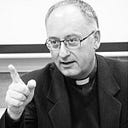The importance of having a Master. Pope Francis and Miguel Ángel Fiorito

On December 13th, on the occasion of the 50th anniversary of his priestly ordination, Pope Francis decided to personally present the writings of his spiritual «master» Father Miguel Ángel Fiorito, published in five volumes by La Civiltà Cattolica. A week after, Francis visited the Roman high school «Pilo Albertelli». A boy asked him: «Is it important to have Masters?». And the Pope replied:
«Finding a Master of life is one of the beautiful things. It is a gift».
It is the first time that a Pontiff speaks so openly of his own Master of life, the man who helped him on the journey, teaching him freedom, helping him to walk on his own two legs in making the choices of life, to seek and to find God. All the Popes have had spiritual references, but they have never spoken directly and publicly about them.

From his Master Bergoglio learned to develop thought with freedom and creativity, so that the lesson learned has
«the stature of a great dream».
But why has Francis decided precisely now to publicly present Father Fiorito to the Church, to tell us who formed him as a man and as Pontiff?
Because there is a message here for the whole Church.
Bergoglio speaking of his Master wants to tell us that the «production of results» is unfortunately shaping the educational relationship, even within the Church. But production — he said in 2004, as Archbishop of Buenos Aires —
«belongs to the environment of industry, of serial and computable effectiveness. A result you can plan and measure».
It implies a list of determined actions that have a predictable effect. And it is the expression of
«a society that tends to transform man into a puppet of consumption».
The Master, no: he or she tends not to produce results, but to «bear fruit», a metaphor that comes from farming and that implies «generating» a new being. For Francis, his Master
«bore flowers and fruit, as his name, Fiorito, expressed well in the hearts of us disciples».
The fruit feeds on those strengths that have already become part of the being of the disciple,
«it is something unique, surprising, original»:
two fruits exactly the same do not exist. Those who have matured their creativity in a truly free way, develop something new starting from the received, accepted and assimilated truth. This is why the Master
«knows that a pupil’s question is worth more than a thousand answers and will encourage the searches without ceasing to be attentive to the risks that they include».
This is why the Holy Father loves questions and often asks to receive them in his encounters. His Master, Fiorito, helped Bergoglio to reconcile his thoughts and his writings with all his conflicting feelings. Because, as St Ignatius of Loyola wrote, «it is not so much the knowing that fills and satisfies the soul, but the feeling and tasting of things internally». The teaching that is abstract from experience is cold, non human.

The logic of the spirit is not rigidly algebraic: it is flexible, elastic, living. It helps you to «be enlarged in God» as St Peter Faber (1506–1546), who Francis came to know and love precisely through Fiorito, wrote.
Bergoglio, with the guidance of his Master, learned to soak up readings and studies like a sponge, but in an always personal, emotional way, and in his «inspired» way. His relationship with the great authors (philosophers, poets, writers, theologians) is dynamic, complex, interior: he combines what he assumes in an original vision, matured with his pastoral experience as a bishop and now Pope.
This is why he is bearing fruit for the good of the church.
The Works of fr. Fiorito: https://www.laciviltacattolica.it/categoria-prodotto/escritos-fiorito/
